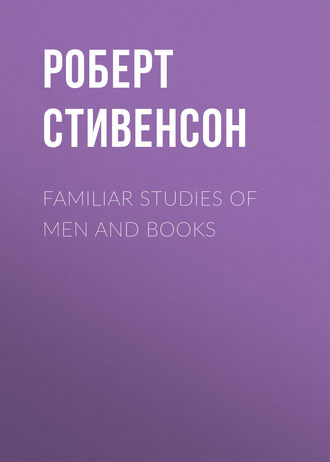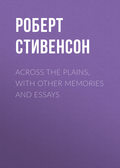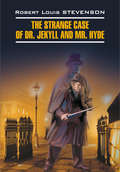
Роберт Льюис Стивенсон
Familiar Studies of Men and Books
III
“To have done anything by which you earned money merely,” says Thoreau, “is to be” (have been, he means) “idle and worse.” There are two passages in his letters, both, oddly enough, relating to firewood, which must be brought together to be rightly understood. So taken, they contain between them the marrow of all good sense on the subject of work in its relation to something broader than mere livelihood. Here is the first: “I suppose I have burned up a good-sized tree to-night – and for what? I settled with Mr. Tarbell for it the other day; but that wasn’t the final settlement. I got off cheaply from him. At last one will say: ‘Let us see, how much wood did you burn, sir?’ And I shall shudder to think that the next question will be, ‘What did you do while you were warm?’” Even after we have settled with Admetus in the person of Mr. Tarbell, there comes, you see, a further question. It is not enough to have earned our livelihood. Either the earning itself should have been serviceable to mankind, or something else must follow. To live is sometimes very difficult, but it is never meritorious in itself; and we must have a reason to allege to our own conscience why we should continue to exist upon this crowded earth.
If Thoreau had simply dwelt in his house at Walden, a lover of trees, birds, and fishes, and the open air and virtue, a reader of wise books, an idle, selfish self-improver, he would have managed to cheat Admetus, but, to cling to metaphor, the devil would have had him in the end. Those who can avoid toil altogether and dwell in the Arcadia of private means, and even those who can, by abstinence, reduce the necessary amount of it to some six weeks a year, having the more liberty, have only the higher moral obligation to be up and doing in the interest of man.
The second passage is this: “There is a far more important and warming heat, commonly lost, which precedes the burning of the wood. It is the smoke of industry, which is incense. I had been so thoroughly warmed in body and spirit, that when at length my fuel was housed, I came near selling it to the ashman, as if I had extracted all its heat.” Industry is, in itself and when properly chosen, delightful and profitable to the worker; and when your toil has been a pleasure, you have not, as Thoreau says, “earned money merely,” but money, health, delight, and moral profit, all in one. “We must heap up a great pile of doing for a small diameter of being,” he says in another place; and then exclaims, “How admirably the artist is made to accomplish his self-culture by devotion to his art!” We may escape uncongenial toil, only to devote ourselves to that which is congenial. It is only to transact some higher business that even Apollo dare play the truant from Admetus. We must all work for the sake of work; we must all work, as Thoreau says again, in any “absorbing pursuit – it does not much matter what, so it be honest;” but the most profitable work is that which combines into one continued effort the largest proportion of the powers and desires of a man’s nature; that into which he will plunge with ardour, and from which he will desist with reluctance; in which he will know the weariness of fatigue, but not that of satiety; and which will be ever fresh, pleasing, and stimulating to his taste. Such work holds a man together, braced at all points; it does not suffer him to doze or wander; it keeps him actively conscious of himself, yet raised among superior interests; it gives him the profit of industry with the pleasures of a pastime. This is what his art should be to the true artist, and that to a degree unknown in other and less intimate pursuits. For other professions stand apart from the human business of life; but an art has its seat at the centre of the artist’s doings and sufferings, deals directly with his experiences, teaches him the lessons of his own fortunes and mishaps, and becomes a part of his biography. So says Goethe:
“Spät erklingt was früh erklang;
Glück und Unglück wird Gesang.”
Now Thoreau’s art was literature; and it was one of which he had conceived most ambitiously. He loved and believed in good books. He said well, “Life is not habitually seen from any common platform so truly and unexaggerated as in the light of literature.” But the literature he loved was of the heroic order. “Books, not which afford us a cowering enjoyment, but in which each thought is of unusual daring; such as an idle man cannot read, and a timid one would not be entertained by, which even make us dangerous to existing institutions – such I call good books.” He did not think them easy to be read. “The heroic books,” he says, “even if printed in the character of our mother-tongue, will always be in a language dead to degenerate times; and we must laboriously seek the meaning of each word and line, conjecturing a larger sense than common use permits out of what wisdom and valour and generosity we have.” Nor does he suppose that such books are easily written. “Great prose, of equal elevation, commands our respect more than great verse,” says he, “since it implies a more permanent and level height, a life more pervaded with the grandeur of the thought. The poet often only makes an irruption, like the Parthian, and is off again, shooting while he retreats; but the prose writer has conquered like a Roman and settled colonies.” We may ask ourselves, almost with dismay, whether such works exist at all but in the imagination of the student. For the bulk of the best of books is apt to be made up with ballast; and those in which energy of thought is combined with any stateliness of utterance may be almost counted on the fingers. Looking round in English for a book that should answer Thoreau’s two demands of a style like poetry and sense that shall be both original and inspiriting, I come to Milton’s Areopagitica, and can name no other instance for the moment. Two things at least are plain: that if a man will condescend to nothing more commonplace in the way of reading, he must not look to have a large library; and that if he proposes himself to write in a similar vein, he will find his work cut out for him.
Thoreau composed seemingly while he walked, or at least exercise and composition were with him intimately connected; for we are told that “the length of his walk uniformly made the length of his writing.” He speaks in one place of “plainness and vigour, the ornaments of style,” which is rather too paradoxical to be comprehensively, true.
In another he remarks: “As for style of writing, if one has anything to say it drops from him simply as a stone falls to the ground.” We must conjecture a very large sense indeed for the phrase “if one has anything to say.” When truth flows from a man, fittingly clothed in style and without conscious effort, it is because the effort has been made and the work practically completed before he sat down to write. It is only out of fulness of thinking that expression drops perfect like a ripe fruit; and when Thoreau wrote so nonchalantly at his desk, it was because he had been vigorously active during his walk. For neither clearness compression, nor beauty of language, come to any living creature till after a busy and a prolonged acquaintance with the subject on hand. Easy writers are those who, like Walter Scott, choose to remain contented with a less degree of perfection than is legitimately within the compass of their powers. We hear of Shakespeare and his clean manuscript; but in face of the evidence of the style itself and of the various editions of Hamlet, this merely proves that Messrs. Hemming and Condell were unacquainted with the common enough phenomenon called a fair copy. He who would recast a tragedy already given to the world must frequently and earnestly have revised details in the study. Thoreau himself, and in spite of his protestations, is an instance of even extreme research in one direction; and his effort after heroic utterance is proved not only by the occasional finish, but by the determined exaggeration of his style. “I trust you realise what an exaggerator I am – that I lay myself out to exaggerate,” he writes. And again, hinting at the explanation: “Who that has heard a strain of music feared lest he should speak extravagantly any more for ever?” And yet once more, in his essay on Carlyle, and this time with his meaning well in hand: “No truth, we think, was ever expressed but with this sort of emphasis, that for the time there seemed to be no other.” Thus Thoreau was an exaggerative and a parabolical writer, not because he loved the literature of the East, but from a desire that people should understand and realise what he was writing. He was near the truth upon the general question; but in his own particular method, it appears to me, he wandered. Literature is not less a conventional art than painting or sculpture; and it is the least striking, as it is the most comprehensive of the three. To hear a strain of music to see a beautiful woman, a river, a great city, or a starry night, is to make a man despair of his Lilliputian arts in language. Now, to gain that emphasis which seems denied to us by the very nature of the medium, the proper method of literature is by selection, which is a kind of negative exaggeration. It is the right of the literary artist, as Thoreau was on the point of seeing, to leave out whatever does not suit his purpose. Thus we extract the pure gold; and thus the well-written story of a noble life becomes, by its very omissions, more thrilling to the reader. But to go beyond this, like Thoreau, and to exaggerate directly, is to leave the saner classical tradition, and to put the reader on his guard. And when you write the whole for the half, you do not express your thought more forcibly, but only express a different thought which is not yours.
Thoreau’s true subject was the pursuit of self-improvement combined with an unfriendly criticism of life as it goes on in our societies; it is there that he best displays the freshness and surprising trenchancy of his intellect; it is there that his style becomes plain and vigorous, and therefore, according to his own formula, ornamental. Yet he did not care to follow this vein singly, but must drop into it by the way in books of a different purport. Walden, or Life in the Woods, A Week on the Concord and Merrimack Rivers, The Maine Woods, – such are the titles he affects. He was probably reminded by his delicate critical perception that the true business of literature is with narrative; in reasoned narrative, and there alone, that art enjoys all its advantages, and suffers least from its defects. Dry precept and disembodied disquisition, as they can only be read with an effort of abstraction, can never convey a perfectly complete or a perfectly natural impression. Truth, even in literature, must be clothed with flesh and blood, or it cannot tell its whole story to the reader. Hence the effect of anecdote on simple minds; and hence good biographies and works of high, imaginative art, are not only far more entertaining, but far more edifying, than books of theory or precept. Now Thoreau could not clothe his opinions in the garment of art, for that was not his talent; but he sought to gain the same elbow-room for himself, and to afford a similar relief to his readers, by mingling his thoughts with a record of experience.
Again, he was a lover of nature. The quality which we should call mystery in a painting, and which belongs so particularly to the aspect of the external world and to its influence upon our feelings, was one which he was never weary of attempting to reproduce in his books. The seeming significance of nature’s appearances, their unchanging strangeness to the senses, and the thrilling response which they waken in the mind of man, continued to surprise and stimulate his spirits. It appeared to him, I think, that if we could only write near enough to the facts, and yet with no pedestrian calm, but ardently, we might transfer the glamour of reality direct upon our pages; and that, if it were once thus captured and expressed, a new and instructive relation might appear between men’s thoughts and the phenomena of nature. This was the eagle that he pursued all his life long, like a schoolboy with a butterfly net. Hear him to a friend: “Let me suggest a theme for you – to state to yourself precisely and completely what that walk over the mountains amounted to for you, returning to this essay again and again until you are satisfied that all that was important in your experience is in it. Don’t suppose that you can tell it precisely the first dozen times you try, but at ’em again; especially when, after a sufficient pause you suspect that you are touching the heart or summit of the matter, reiterate your blows there, and account for the mountain to yourself. Not that the story need be long, but it will take a long while to make it short.” Such was the method, not consistent for a man whose meanings were to “drop from him as a stone falls to the ground.” Perhaps the most successful work that Thoreau ever accomplished in this direction is to be found in the passages relating to fish in the Week. These are remarkable for a vivid truth of impression and a happy suitability of language, not frequently surpassed.
Whatever Thoreau tried to do was tried in fair, square prose, with sentences solidly built, and no help from bastard rhythms. Moreover, there is a progression – I cannot call it a progress – in his work towards a more and more strictly prosaic level, until at last he sinks into the bathos of the prosy. Emerson mentions having once remarked to Thoreau: “Who would not like to write something which all can read, like Robinson Crusoe? and who does not see with regret that his page is not solid with a right materialistic treatment which delights everybody?” I must say in passing that it is not the right materialistic treatment which delights the world in Robinson, but the romantic and philosophic interest of the fable. The same treatment does quite the reverse of delighting us when it is applied, in Colonel Jack, to the management of a plantation. But I cannot help suspecting Thoreau to have been influenced either by this identical remark or by some other closely similar in meaning. He began to fall more and more into a detailed materialistic treatment; he went into the business doggedly, as one who should make a guide-book; he not only chronicled what had been important in his own experience, but whatever might have been important in the experience of anybody else; not only what had affected him, but all that he saw or heard. His ardour had grown less, or perhaps it was inconsistent with a right materialistic treatment to display such emotions as he felt; and, to complete the eventful change, he chose, from a sense of moral dignity, to gut these later works of the saving quality of humour. He was not one of those authors who have learned, in his own words, “to leave out their dulness.” He inflicts his full quantity upon the reader in such books as Cape Cod, or The Yankee in Canada. Of the latter he confessed that he had not managed to get much of himself into it. Heaven knows he had not, nor yet much of Canada, we may hope. “Nothing,” he says somewhere, “can shock a brave man but dulness.” Well, there are few spots more shocking to the brave than the pages of The Yankee in Canada.
There are but three books of his that will be read with much pleasure: the Week, Walden, and the collected letters. As to his poetry, Emerson’s word shall suffice for us, it is so accurate and so prettily said: “The thyme and majoram are not yet honey.” In this, as in his prose, he relied greatly on the goodwill of the reader, and wrote throughout in faith. It was an exercise of faith to suppose that many would understand the sense of his best work, or that any could be exhilarated by the dreary chronicling of his worst. “But,” as he says, “the gods do not hear any rude or discordant sound, as we learn from the echo; and I know that the nature towards which I launch these sounds is so rich that it will modulate anew and wonderfully improve my rudest strain.”
IV
“What means the fact,” he cries, “that a soul which has lost all hope for itself can inspire in another listening soul such an infinite confidence in it, even while it is expressing its despair?” The question is an echo and an illustration of the words last quoted; and it forms the key-note of his thoughts on friendship. No one else, to my knowledge, has spoken in so high and just a spirit of the kindly relations; and I doubt whether it be a drawback that these lessons should come from one in many ways so unfitted to be a teacher in this branch. The very coldness and egoism of his own intercourse gave him a clearer insight into the intellectual basis of our warm, mutual tolerations; and testimony to their worth comes with added force from one who was solitary and disobliging, and of whom a friend remarked, with equal wit and wisdom, “I love Henry, but I cannot like him.”
He can hardly be persuaded to make any distinction between love and friendship; in such rarefied and freezing air, upon the mountain-tops of meditation, had he taught himself to breathe. He was, indeed, too accurate an observer not to have remarked that “there exists already a natural disinterestedness and liberality” between men and women; yet, he thought, “friendship is no respecter of sex.” Perhaps there is a sense in which the words are true; but they were spoken in ignorance; and perhaps we shall have put the matter most correctly, if we call love a foundation for a nearer and freer degree of friendship than can be possible without it. For there are delicacies, eternal between persons of the same sex, which are melted and disappear in the warmth of love.
To both, if they are to be right, he attributes the same nature and condition. “We are not what we are,” says he, “nor do we treat or esteem each other for such, but for what we are capable of being.” “A friend is one who incessantly pays us the compliment of expecting all the virtues from us, and who can appreciate them in us.” “The friend asks no return but that his friend will religiously accept and wear and not disgrace his apotheosis of him.” “It is the merit and preservation of friendship that it takes place on a level higher than the actual characters of the parties would seem to warrant.” This is to put friendship on a pedestal indeed; and yet the root of the matter is there; and the last sentence, in particular, is like a light in a dark place, and makes many mysteries plain. We are different with different friends; yet if we look closely we shall find that every such relation reposes on some particular apotheosis of oneself; with each friend, although we could not distinguish it in words from any other, we have at least one special reputation to preserve: and it is thus that we run, when mortified, to our friend or the woman that we love, not to hear ourselves called better, but to be better men in point of fact. We seek this society to flatter ourselves with our own good conduct. And hence any falsehood in the relation, any incomplete or perverted understanding, will spoil even the pleasure of these visits. Thus says Thoreau again: “Only lovers know the value of truth.” And yet again: “They ask for words and deeds, when a true relation is word and deed.”
But it follows that since they are neither of them so good as the other hopes, and each is, in a very honest manner, playing a part above his powers, such an intercourse must often be disappointing to both. “We may bid farewell sooner than complain,” says Thoreau, “for our complaint is too well grounded to be uttered.” “We have not so good a right to hate any as our friend.”
“It were treason to our love
And a sin to God above,
One iota to abate
Of a pure, impartial hate.”
Love is not blind, nor yet forgiving. “O yes, believe me,” as the song says, “Love has eyes!” The nearer the intimacy, the more cuttingly do we feel the unworthiness of those we love; and because you love one, and would die for that love to-morrow, you have not forgiven, and you never will forgive, that friend’s misconduct. If you want a person’s faults, go to those who love him. They will not tell you, but they know. And herein lies the magnanimous courage of love, that it endures this knowledge without change.
It required a cold, distant personality like that of Thoreau, perhaps, to recognise and certainly to utter this truth; for a more human love makes it a point of honour not to acknowledge those faults of which it is most conscious. But his point of view is both high and dry. He has no illusions; he does not give way to love any more than to hatred, but preserves them both with care like valuable curiosities. A more bald-headed picture of life, if I may so express myself, has seldom been presented. He is an egoist; he does not remember, or does not think it worth while to remark, that, in these near intimacies, we are ninety-nine times disappointed in our beggarly selves for once that we are disappointed in our friend; that it is we who seem most frequently undeserving of the love that unites us; and that it is by our friend’s conduct that we are continually rebuked and yet strengthened for a fresh endeavour. Thoreau is dry, priggish, and selfish. It is profit he is after in these intimacies; moral profit, certainly, but still profit to himself. If you will be the sort of friend I want, he remarks naïvely, “my education cannot dispense with your society.” His education! as though a friend were a dictionary. And with all this, not one word about pleasure, or laughter, or kisses, or any quality of flesh and blood. It was not inappropriate, surely, that he had such close relations with the fish. We can understand the friend already quoted, when he cried: “As for taking his arm, I would as soon think of taking the arm of an elm-tree!”
As a matter of fact he experienced but a broken enjoyment in his intimacies. He says he has been perpetually on the brink of the sort of intercourse he wanted, and yet never completely attained it. And what else had he to expect when he would not, in a happy phrase of Carlyle’s, “nestle down into it”? Truly, so it will be always if you only stroll in upon your friends as you might stroll in to see a cricket match; and even then not simply for the pleasure of the thing, but with some afterthought of self-improvement, as though you had come to the cricket match to bet. It was his theory that people saw each other too frequently, so that their curiosity was not properly whetted, nor had they anything fresh to communicate; but friendship must be something else than a society for mutual improvement – indeed, it must only be that by the way, and to some extent unconsciously; and if Thoreau had been a man instead of a manner of elm-tree, he would have felt that he saw his friends too seldom, and have reaped benefits unknown to his philosophy from a more sustained and easy intercourse. We might remind him of his own words about love: “We should have no reserve; we should give the whole of ourselves to that business. But commonly men have not imagination enough to be thus employed about a human being, but must be coopering a barrel, forsooth.” Ay, or reading oriental philosophers. It is not the nature of the rival occupation, it is the fact that you suffer it to be a rival, that renders loving intimacy impossible. Nothing is given for nothing in this world; there can be no true love, even on your own side, without devotion; devotion is the exercise of love, by which it grows; but if you will give enough of that, if you will pay the price in a sufficient “amount of what you call life,” why then, indeed, whether with wife or comrade, you may have months and even years of such easy, natural, pleasurable, and yet improving intercourse as shall make time a moment and kindness a delight.
The secret of his retirement lies not in misanthropy, of which he had no tincture, but part in his engrossing design of self-improvement and part in the real deficiencies of social intercourse. He was not so much difficult about his fellow human beings as he could not tolerate the terms of their association. He could take to a man for any genuine qualities, as we see by his admirable sketch of the Canadian woodcutter in Walden; but he would not consent, in his own words, to “feebly fabulate and paddle in the social slush.” It seemed to him, I think, that society is precisely the reverse of friendship, in that it takes place on a lower level than the characters of any of the parties would warrant us to expect. The society talk of even the most brilliant man is of greatly less account than what you will get from him in (as the French say) a little committee. And Thoreau wanted geniality; he had not enough of the superficial, even at command; he could not swoop into a parlour and, in the naval phrase, “cut out” a human being from that dreary port; nor had he inclination for the task. I suspect he loved books and nature as well and near as warmly as he loved his fellow-creatures, – a melancholy, lean degeneration of the human character.
“As for the dispute about solitude and society,” he thus sums up: “Any comparison is impertinent. It is an idling down on the plain at the base of the mountain instead of climbing steadily to its top. Of course you will be glad of all the society you can get to go up with? Will you go to glory with me? is the burden of the song. It is not that we love to be alone, but that we love to soar, and when we do soar the company grows thinner and thinner till there is none at all. It is either the tribune on the plain, a sermon on the mount, or a very private ecstasy still higher up. Use all the society that will abet you.” But surely it is no very extravagant opinion that it is better to give than to receive, to serve than to use our companions; and above all, where there is no question of service upon either side, that it is good to enjoy their company like a natural man. It is curious and in some ways dispiriting that a writer may be always best corrected out of his own mouth; and so, to conclude, here is another passage from Thoreau which seems aimed directly at himself: “Do not be too moral; you may cheat yourself out of much life so… All fables, indeed, have their morals; but the innocent enjoy the story.”







